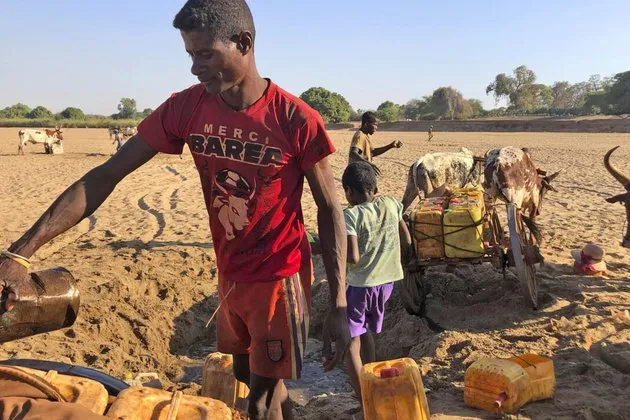A record-breaking heatwave that devastated Madagascar in October of last year would have been “virtually impossible” without human-induced global warming, a recent study has conclusively shown. The extreme temperatures had a profound impact on millions of extremely poor people, yet the damage it inflicted on their lives remained unrecorded by officials and the media. This lack of information hindered the implementation of measures to prevent deaths and makes it challenging for governments and communities to prepare for similar disasters in the future.
The study, conducted by the World Weather Attribution group, was the first of its kind in sub-Saharan Africa and found that temperatures during the heatwave were a staggering 2.5C higher than the recent average. Antananarivo, the capital of Madagascar and home to over 3 million people, suffered the most severe heat-related anomalies. If global temperatures continue to rise, fueled by fossil fuel burning, this intensity of heatwave would become an expected occurrence every five years, the researchers calculated.
The phenomenon is part of a broader global trend, with hundreds of climate studies now showing that human-induced global warming is increasing the frequency and intensity of extreme weather events worldwide. Heatwaves alone are likely to have caused millions of unreported early deaths over the last three decades.
The lack of funding from wealthy countries to help developing nations cope with climate-related impacts will be a major topic of discussion at the upcoming UN Cop28 climate summit. Dr. Rondrotiana Barimalala, an oceanographer from Madagascar now working at the Norwegian Research Centre in Bergen, emphasized the urgency of the situation, stating, “Madagascar is already being impacted by climate change, making life harder for millions of people. It is critical that communities and governments take steps to become more resilient.”

More than 90% of Madagascar’s residents live in poverty, and half do not have access to clean water or electricity. Many live in informal housing, making it difficult for them to cope with extreme heat. Dr. Izidine Pinto, a climatologist at the Royal Netherlands Meteorological Institute, noted, “Africa is notorious for the underreporting of heat impacts. Many countries experiencing poverty simply don’t have the means to manage extreme heat.”
Despite the lack of official records, anecdotal reports suggest that night-time temperatures during the heatwave made it challenging for children to breathe. Sayanti Sengupta of the Red Cross Red Crescent Climate Centre emphasized, “Just because it’s not reported doesn’t mean it’s not impacting – it is for sure.”
As global temperature records continue to shatter, leading climate scientists warn that the extreme weather events like the one in Madagascar are only the “tip of the iceberg” compared to the even more devastating impacts that are yet to come. Dr. Friederike Otto, a senior lecturer in climate science at Imperial College London, urged, “Climate change is a problem created and made worse by the richest countries and companies, but the poorest are suffering the most. At Cop28, we need commitments from developed countries to deliver finance to the loss and damage fund.”

